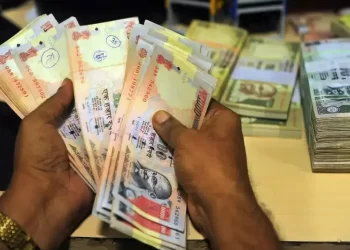HONG KONG: Asian markets mostly fell Monday following last week’s losses, with traders trying to assess the Federal Reserve’s plans for interest rates, while the euro was weighed by political uncertainty as France prepares for a snap parliamentary election.
While data showed US inflation slowed in May provided fresh hope that the central bank will cut interest rates this year, optimism was tempered by policymakers’ paring of expectations for how many would be made.
And over the weekend, Minneapolis Fed chief Neel Kashkari said officials need not rush to loosen policy, while his Cleveland counterpart Loretta Mester remained concerned that inflation could still pick back up.
Meanwhile, the spike in prices is having an impact on consumer sentiment, with a gauge hitting a seven-month low in June, figures showed.
The Fed now sees just one rate cut this year, while analyst opinion varies from zero to three.
Traders are now awaiting the release of a US retail sales report as well as inflation figures and central bank policy decisions in various countries over the next five days.
While the Nasdaq chalked up yet another record high, Wall Street provided a tepid lead with the S&P 500 and Dow both down.
Tokyo, Shanghai, Sydney, Seoul and Wellington all dropped, though Hong Kong and Taipei edged up.
Several markets including Jakarta, Mumbai and Singapore were closed for holidays.
There was little reaction to May Chinese data showing retail sales beating expectations – boosting hopes for an improvement in consumer activity – but industrial production grew less than forecast and house prices fell further.
The euro faced further pressure from the dollar owing to concerns about the upcoming polls in France, which President Emmanuel Macron called after his party lost out to the far right National Rally (RN) in EU-wide elections last weekend.
The move has fanned fears about stability in Europe’s second biggest economy, and observers said the country could be on course for a standoff with the bloc if extremists win.
Left-wing parties including the hard-left France Unbowed, the Socialist, Communist and Green parties said they had agreed – despite long-running policy differences – on an election alliance to fight RN and its leader Marine Le Pen.
The group has drawn up a manifesto that reverses a number of Macron’s reforms over the past seven years, while pushing back against the European Union’s fiscal pact governing debt and deficits.
“Uncertainty over the extent to which the far right RN party will have effective control of the next French parliament after July 7 will be an ongoing source of market angst in the coming two to three weeks,” said Ray Attrill at National Australia Bank.
Worries about the election hammered Paris stocks last week, pushing them down more than two percent Friday, which weighed on other European bourses.
HONG KONG: Asian markets mostly fell Monday following last week’s losses, with traders trying to assess the Federal Reserve’s plans for interest rates, while the euro was weighed by political uncertainty as France prepares for a snap parliamentary election.
While data showed US inflation slowed in May provided fresh hope that the central bank will cut interest rates this year, optimism was tempered by policymakers’ paring of expectations for how many would be made.
And over the weekend, Minneapolis Fed chief Neel Kashkari said officials need not rush to loosen policy, while his Cleveland counterpart Loretta Mester remained concerned that inflation could still pick back up.
Meanwhile, the spike in prices is having an impact on consumer sentiment, with a gauge hitting a seven-month low in June, figures showed.
The Fed now sees just one rate cut this year, while analyst opinion varies from zero to three.
Traders are now awaiting the release of a US retail sales report as well as inflation figures and central bank policy decisions in various countries over the next five days.
While the Nasdaq chalked up yet another record high, Wall Street provided a tepid lead with the S&P 500 and Dow both down.
Tokyo, Shanghai, Sydney, Seoul and Wellington all dropped, though Hong Kong and Taipei edged up.
Several markets including Jakarta, Mumbai and Singapore were closed for holidays.
There was little reaction to May Chinese data showing retail sales beating expectations – boosting hopes for an improvement in consumer activity – but industrial production grew less than forecast and house prices fell further.
The euro faced further pressure from the dollar owing to concerns about the upcoming polls in France, which President Emmanuel Macron called after his party lost out to the far right National Rally (RN) in EU-wide elections last weekend.
The move has fanned fears about stability in Europe’s second biggest economy, and observers said the country could be on course for a standoff with the bloc if extremists win.
Left-wing parties including the hard-left France Unbowed, the Socialist, Communist and Green parties said they had agreed – despite long-running policy differences – on an election alliance to fight RN and its leader Marine Le Pen.
The group has drawn up a manifesto that reverses a number of Macron’s reforms over the past seven years, while pushing back against the European Union’s fiscal pact governing debt and deficits.
“Uncertainty over the extent to which the far right RN party will have effective control of the next French parliament after July 7 will be an ongoing source of market angst in the coming two to three weeks,” said Ray Attrill at National Australia Bank.
Worries about the election hammered Paris stocks last week, pushing them down more than two percent Friday, which weighed on other European bourses.









